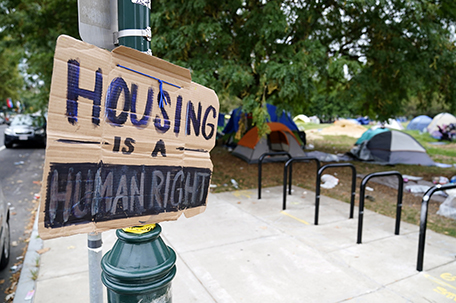
ABOVE PHOTO: In this Sept. 9, 2020 file photo, a sign is displayed near a homeless encampment on the Benjamin Franklin Parkway, in Philadelphia. (AP Photo/Matt Slocum, File)
By Amy V. Simmons
The intersection between the need for adequate, affordable housing and the political will to effectively address that need has been at the forefront of most local and national campaigns for decades.
A recent mayoral forum organized by the Philadelphia Association of Community Development Corporations (PACDC) brought together community stakeholders and candidates to discuss what these issues mean for Philadelphia in the 21st century at the Broad Street Ministry in Center City. Moderated by Loraine Ballard Morrill, director of news and community affairs for iHeartMedia Philadelphia, the forum consisted of questions from community stakeholders and leaders, as well as from the audience. Candidates in attendance included former City Councilmembers Allan Domb and Helen Gym, former City Controller Rebecca Rhynhart, and retired judge James DeLeon.
Historic remedies, current realities
In his State of the Union address on January 11, 1944, Franklin Delano Roosevelt declared that America needed a “second Bill of Rights” that included “the right of every family to a decent home.” President Lyndon Baines Johnson signed the Fair Housing Act of 1968, and subsequent presidents, federal and local officials have all introduced new programs and laws that have addressed voter concerns about housing throughout the decades.
In spite of this, government-sponsored housing programs and initiatives have often faced opposition, mismanagement, and restrictions. The post-WWII GI Bill that helped many returning veterans purchase homes was not equally administered. Early public housing projects were often limited to white families only. So-called “urban renewal” and highway construction projects that ran through communities and removed entire neighborhoods also exacerbated the situation.
In the 21st century, the internet is the primary means through which people experiencing housing insecurity can access information that can help them, but irregular internet access makes them even more vulnerable. Low credit ratings, difficulty in raising money for security deposits or down payments, and low income also play a significant role.
Meanwhile, gentrification and development continue to transform the communities which have been home to multiple generations, rendering them unrecognizable and unaffordable.
Taking the local temperature regarding affordable housing
The majority of those affected by housing insecurity are people of color — many of them African American — and the poor. These constituencies and those who seek to assist them are deeply concerned, and more than a little frustrated.
One of the keys to a stable community is a thriving business district. More investment in reviving the business corridors of Philadelphia’s most distressed neighborhoods is needed, Domb said in response to the first question, which was focused on resource allocation.
“Sections of the city are in really bad shape — whether it’s 52nd and Market, or 60th and Market, Germantown below Erie by Max’s Steaks or other areas of the city,” Domb said.
Judge DeLeon would like to see some of the programs that helped even low-income residents get in on the property ladder in the past brought back.
“At one time, we used to give properties away for $1 in the city,” DeLeon said. “We used to give businesses away for $1 in the city, and the homes that these businesses were in — we need to go back to that.”
Historic disinvestment driven by racist policies is at the core of the problem, and must be addressed, Gym said.
“We have to change everything about the way we do transformative investments in communities,” she said. “To me, this is as much about what is just and right as much as it is about need, so I would absolutely deliver services based on need.”
The issue of evictions was foremost in the minds of the attendees, many of whom were housing rights advocates or were personally facing the issue. Concerns about rent control issues also resonated throughout the forum — and outside of the venue itself — and tensions and tempers ran high.
In order to address these acute situations, people want both short-term and long-term solutions that are viable, and those present did not hold back when it came to demanding them.
More than one protester outside the venue and some who were in the audience raised the issue of Angel Davis as a case in point. The 35-year-old woman was shot twice in the head on March 29 during an eviction process conducted by an armed landlord-tenant officer at the Girard Court Apartments, located in the city’s Sharswood section. Davis survived her wounds. An active investigation is underway. The disturbing incident led Senators Sharif Street (D- 3rd Dist.) and Nikil Saval (D-1st Dist.) to introduce a bill to outlaw contracting out evictions to private companies by amending the state’s codes.
Utilizing what works, fixing what does not
A question concerning gentrification, equitable development, and displacement of long-term residents also generated a robust response.
Connecting with the services that could provide relief is one of the problems associated with housing insecurity and the chaos it creates.
Domb said that a centralized information system, where the organizations that are providing assistance could be easily accessed, would help address this.
“I’m going to use Benefits Data Trust, United Way or the Campaign for Working Families, where people know where to go to find out all the different benefits that are available,” Domb said. “There’s so many different benefits.”
Another development-related concern was raised by licensed real estate broker Judith Robinson about Philadelphia’s wholesaler bill — Philadelphia Bill 200544 — whose passage current mayoral candidates Domb, Gym and Parker supported as councilmembers in 2020. The legislation targets unscrupulous business practices from real estate speculators and developers who acquire a huge amount of property through means such as “we buy houses for cash” transactions — often promoted with the use of so-called “bandit signs” stapled to telephone poles or displayed on lawns — without full disclosure from unwitting homeowners.
The bill was meant to regulate the practice yet has faced significant problems regarding enforcement. Still, Domb stands by the legislation, as does Rhynhart, who said that she would like to see it strengthened.
The Philadelphia Land Bank program needs a rehaul.
There was also discussion about the need for a functioning land bank in the city. All the candidates agreed that responsible, equitable land use in Philadelphia is an issue that must be addressed proactively when it comes to sustainability, safety, and stability.
According to the description of the Philadelphia Land Bank’s 2019 Strategic Plan, the program should be identifying “opportunities to turn vacant land into affordable and market-rate housing, into community gardens, and into side and rear yards,” as well as identifying “opportunities to leverage vacant properties into economic development, especially economic development that creates jobs.”
This just is not happening at an acceptable rate or in an equitable manner, the candidates agreed.
A strong city planner is necessary to manage the situation, DeLeon said. The plan that he or she should implement would include affordable single and multiple-family dwellings, with an emphasis on including green spaces within the design, he said.
Our use of vacant land in general needs to be viewed holistically, Rhynhart said.
“I’ve put forth a plan on how we should be using the city-owned vacant properties and lots, but they’re many vacant properties across our city,” Rhynhart said. “We need to be very thoughtful. That’s why I propose putting forth a citywide housing plan, and we also need to look at other uses. We need to make sure that there’s green space in every neighborhood. We need to look at the arts in terms of where the arts can be displayed on vacant land. We need to look at holistically what can be done to beautify the neighborhoods and vacant properties within a neighborhood.”
The land bank program must be more transparent, Gym said.
“So, as somebody who followed the land bank from its inception to where it is today, believe me, I know the pain of seeing a visionary idea that needs to come to fruition,” she said. “To me, it starts with transparency. Like, honestly, nobody really knows what’s happening within the land bank. There’s nothing publicly accountable or available. There is a completely obscure application system. There’s no form of accountability. I do believe that there is a chance even within difficult systems.
There is a chance that when there’s a tremendous amount of transparency — when we can see public accountability, [and] when there’s mapping of communities — that actually, it has a profound impact on how to change things internally.”
The land bank program performance has “been dismal,” Domb said.
“I think last year we sold less than 300 properties and less than 30 were for 30% AMI (Area Median Income),” Domb said. “That’s a disgrace.”
The program is costing the city rather than helping to address the vacancy problem, he said.
“At one point a few years ago, I remember seeing a cost estimate of maintaining these properties,” he said. “This was maybe five or six years ago. It was costing us around 15 to $20 million to maintain all of these vacant properties and vacant buildings. Why we’re doing this I have no idea.”
The program should focus on what is needed most — affordable housing at both the 30% AMI level and other levels, Domb said.
“We have the tool to do it,” he said. “We should be utilizing it — sitting on it is costing us money. It’s kind of crazy.”
The role of Philadelphia’s next mayor and his or her government’s vision for partnerships with CDCs, increasing affordable housing supply, rent subsidies, expanding first-time home ownership and other related topics were also discussed during the forum.
The primary election is Tuesday, May 16.















Leave a Comment